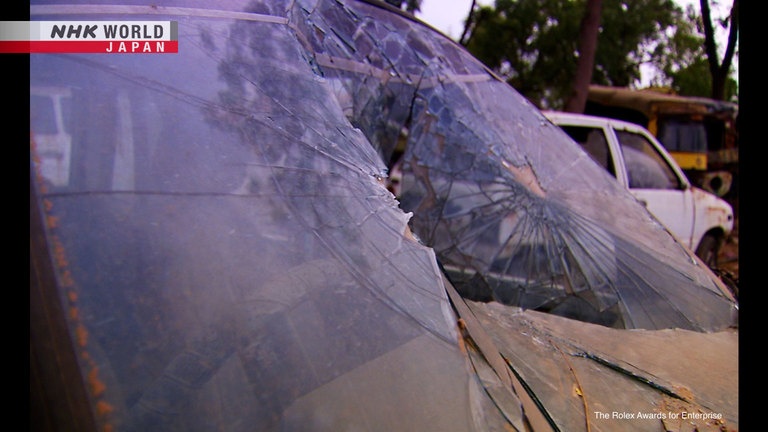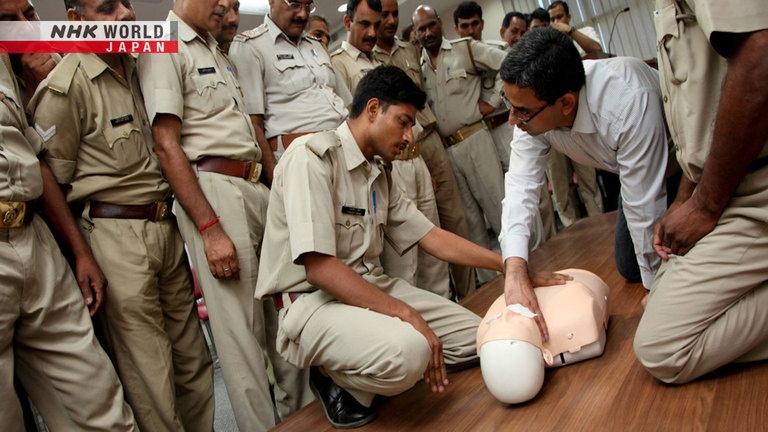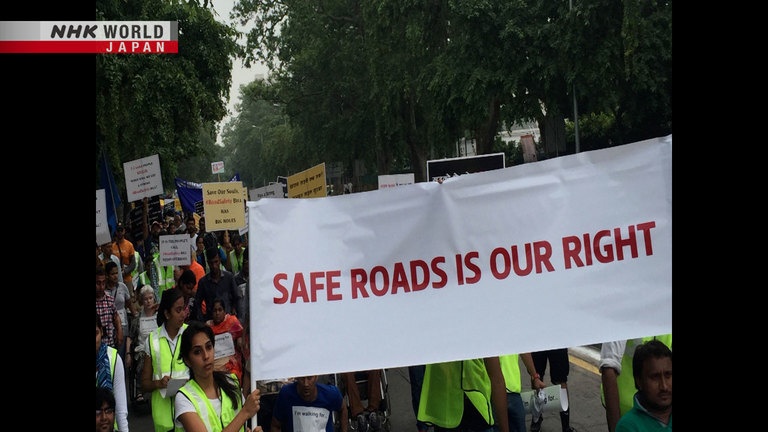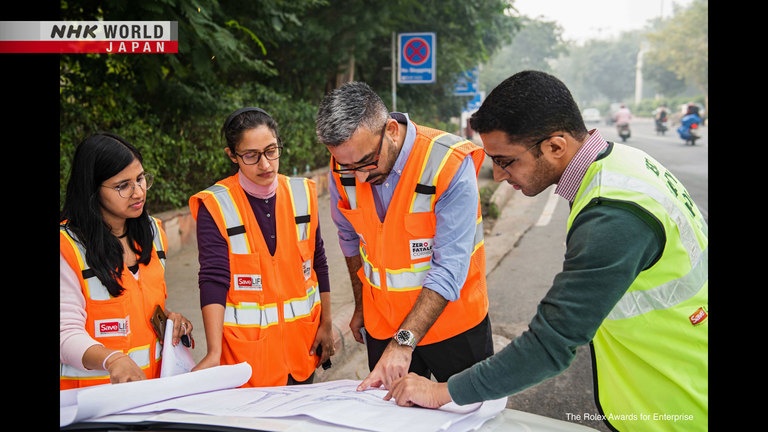Save Lives on India's Roads: Piyush Tewari / Founder & CEO of SaveLIFE Foundation
India tops traffic deaths. Piyush Tewari, driven by loss, founded an NGO for zero victims. He teaches first aid, improves roads and advocates laws easing legal fears. He tells us his lifelong mission.

India leads global traffic deaths, with 150,000+ casualties yearly. Half could be saved with timely medical care.

After his cousin's death in a car accident, Piyush Tewari founded SaveLIFE Foundation, striving to eliminate car accident victims. He conducts nationwide first aid workshops.

They advocate for India's "Good Samaritan Law," protecting those providing first aid at accident scenes from liability if the person's condition worsens.

To cut traffic accidents, they enhance highway and intersection road maintenance.
Transcript
Direct Talk
India witnesses over 400,000
annual auto crashes,
ranking its roads among the most dangerous.
In response, Piyush Tewari
launched an NGO
dedicated to lowering the number of victims.
He conducts first aid training courses
across different parts of India,
aiming to embed life-saving
practices in the country.
Furthermore, Tewari contributes to
protecting pedestrians with better roads
working with the Indian transport officials.
In the previous decade, a million people
had been killed in a road crash in India.
So it was a big issue.
We talk to Tewari, who has committed his life
to the pursuit of zero casualties on roads.
As India's economy grows,
the car population rises,
resulting in over 150,000
annual fatalities in auto crashes.
That contributes to approximately
10% of global traffic-related deaths.
Despite this alarming statistic,
the availability of ambulances
is notably scarce
especially in rural areas, leading to
delayed response times at crash sites.
Consequently, it becomes
imperative for individuals
present at the scene
to administer essential first aid.
It could be various factors
why an ambulance might arrive late.
It could be the capacity
of the ambulance service.
It could also be
disintegration or lack of
integration of multiple services.
Sometimes you know, people might
call the police instead of the ambulance.
So that connectivity is currently missing.
You see, each year India loses
over 150,000 people to road crashes.
Nearly 50% of these people are those
who can be saved if they got care on time.
Tewari's organization conducts
first aid training sessions nationwide
for both police officers
and civilians in India.
The curriculum covers essential topics
such as bleeding control and CPR techniques.
What we teach people to do
is essentially informal care.
This is basic care that
can be provided to keep a person
alive or keep a person aware
before they reach a hospital,
before they reach decisive care.
What we believe is that
if we can provide proper training
in terms of how to help
injured persons on the road,
we can significantly enhance the outcomes
in these crashes and end up saving lives.
We have many cases.
More recently, we had a case where
a gentleman called Mr.
had been run over by a truck in New Delhi.
And the police teams that arrived
on the scene to assist him,
had been trained by SaveLIFE.
They safely lifted him, you know,
kept him in the police car,
and rushed him to the hospital
by providing CPR.
And before entering
Delhi's main trauma center,
they were able to revive that victim
and we were able to save that person's life.
Tewari was born in Kampur
in 1980 and raised in Delhi.
Both his parents had
master's degrees in economics.
That instilled a strong work ethic in Tewari.
He ultimately earned a master's in public
administration from Harvard University.
Following graduation, he ventured
into the business world.
Throughout his journey, an influential figure
in his life was his cousin Shivam.
Despite a significant age gap,
Tewari cherished Shivam like a son,
specially after the early loss of his father.
However, tragedy would soon
disrupt their bond.
I still remember the day very clearly.
This was the 5th of April 2007.
I was on my way back from work
when I received a call from my father
informing me that my cousin
had met with a very serious crash.
I told him that I'm on my way home,
that I will try to get there faster.
After he put the phone down in about
15 minutes, I received another call from him
in which he informed me that
my cousin had passed away.
And that really was something that
struck me as a bolt of lightning, because
when I heard that he had met
with the crash, I had not realized that
it was so severe that
he would die in that crash.
You know, in my younger days,
I used to visit my grandmother
where Shivam used to live.
And I still remember, you know,
lying on the rooftop,
all of us cousins together and
looking at the stars, the night sky.
And later on I discovered
after the cremation,
I discovered that
the main cause of his death
was not just the injuries
suffered in the crash,
but that the fact that he was
lying on the road for a very long time
and did not get help from
bystanders and passersby.
You know, the first thought
was obviously anger.
The first emotion was obviously anger
that how could we allow
a young, lively person to die
like that in front of the public view?
And anger soon changed
to a feeling of helplessness
that, you know, the fact that
somebody could have been saved
And maybe he also felt helpless
at that point of time.
So I think that's something
that anger and helplessness
is the initial emotion that I experienced.
And then, of course,
as I found out more about the issue,
all of the fact turned into resolve
to try to fight and tackle this issue
so that others don't die
in this manner on our roads,
or anywhere in the world, for that matter,
The loss of his cousin left him questioning
the reason behind an untimely death.
Taking a year-long hiatus from work,
Tewari extensively researched
the state of road crashes in India,
engaging with lawyers, police officers,
doctors and the families of victims.
In 2008, he established the non-governmental
organization SaveLIFE Foundation,
to eradicate road fatalities in India.
Within the group, many of the
staff members are volunteers
who have lost family members
or loved ones in auto crashes.
Tewari too quit his job at his private equity
fund to devote himself to NGO activities.
One thing he learned through this effort
is the reluctance of bystanders
to provide aid like CPR at crash scenes
due to fear of legal repercussions
if a victim's state worsened.
Tewari's goal was to enact
the Good Samaritan Law.
Good Samaritan Law
The law ensures that those administering
first aid would not be held liable
for any deterioration in the
injured person's condition.
This law is already in effect in the U.S.,
Canada, Australia, and other countries.
You see traditionally what
has been happening in India is that after
a road crash occurs
and a person is seriously injured,
the passersby and
bystanders crowd around.
They want to see what's happening
and many people want to help.
In the case of my cousin,
they offered him water.
Some people even threw water
to keep him awake.
But unfortunately, because of a very profound
fear of getting involved in a legal case,
people did not do anything
that would save his life.
They didn't call the ambulance.
They didn't call the police,
and it was too late by the time
somebody took him to the hospital.
So this inaction really is
what caused the delay
that, you know, took his life eventually.
And something that could have saved his life.
And I think that's really
what started the process
of getting India the Good Samaritan law
that could protect people
from any kind of legal hassles
if they come forward to help
the injured person on the road.
Tewari devoted himself to
championing the Good Samaritan Law.
He raised concerns about the
Indian government's lack of action
regarding traffic accidents
and advocated for the adoption
of the crucial law.
One of the after I had moved to
the honorable Supreme Court of India to
ask for the Good Samaritan law,
one of the things that we wanted to do was
to demonstrate that this is a public issue,
that this is not just an issue of one person.
In that process, I had done
a simple Facebook post
to say that, you know, people who have
been affected by this issue should meet,
everybody should meet
at Indian Gate at Delhi.
And we'll do a
candlelight march in solidarity
and in memory of our family members
who will be lost to road crashes.
I was not expecting more than
2 or 300 people to turn up.
But as the day went along, we had,
you know, 3 to 5000 people who joined us
showing that this is such a
large issue that affects people.
In 2016, Tewari's hard work paid off
as the Supreme Court of India incorporated
guidelines of the Good Samaritan Law.
I still remember that,
you know, hearing them
pronounce that judgment,
I immediately started remembering my cousin
and that this was a you know,
after eight years of fight
that we were able to get this law
that could save those lives.
So yeah, I had tears in my eyes
and I had goosebumps in my body.
And I think that was really
how I felt when this,
you know, when the judgment was pronounced.
And then the next task
was very clear in front of me,
which is that we now have to
tell people about this,
that they are protected,
that they have this new law
and also walk towards
preventing crashes in the first place.
And that's the second evolution
of SaveLIFE that started,
which is the focus on prevention
of crashes in the first place.
Tewari's next focus was on enhancing
road safety and lower crash rates.
The Mumbai Airport Expressway spans
130 kilometers, connecting Mumbai and Pune.
It's identified as one of
India's deadliest roads,
witnessing around 150 annual fatalities.
Tewari initiated a project
to reduce casualties,
teaming up with the Indian Ministry
of Road and Transport Highways.
Patrol cars were equipped with speed radar
detectors to monitor traffic violations,
and ambulances were strategically placed on
standby for prompt responses to crash scenes.
And as a result of that, within 2016 and 2023,
we have now seen an
over 60% reduction in deaths
on roads on the Mumbai Airport Expressway.
Attention was next directed
towards intersections
where main roads met side streets,
notorious for frequent accidents.
Brightly colored traffic cones
were carefully positioned
to create designated spaces,
ensuring safe pedestrian passage.
The result of this has been that on average
we have been able to reduce the exposure
of pedestrians to oncoming traffic by 60%.
Which means that earlier, pedestrians were,
if they had to, you know,
face oncoming traffic for six minutes.
Now they have to face
oncoming traffic for only for a minute,
while crossing the intersection
or crossing the road.
So far we've done this on
22 locations across the country.
This year by March
it would be 25 locations overall.
We have in September 2023, signed
a partnership with the Government of India
to take this initiative to 100 highways
and 100 districts across the country.
So we are in the process of
scaling this effort across India
to 16 of the biggest states
that suffered almost 85% of all deaths
in road crashes in the country.
But the most exciting part of the effort
is that we are now taking this work global.
So we'll be taking this work to
other low- or medium-income countries
that have a high vulnerable crash fatalities
like Bangladesh, like Thailand, like Kenya,
and perhaps the Latin America,
where we can contribute to reducing
deaths in a significant manner.
And we feel that the solution that we have,
because it comes from a complex environment
like India and from the global South
will be applicable to many other countries
because we understand the cultural nuances
and the complexities of such environments.
We ask Tewari his favorite words.
It says
"Saving lives on roads in India and beyond."
Well, this is the mission statement of
SaveLIFE Foundation and this really guides us
in terms of what we are doing, why we are
doing, and then where we're doing it.
I don't think I could have been
happier than I am today
because I'm doing something
that gives me purpose.
I think "ikigai" as we, you know, call it.
So I think it gives me purpose
it gives all of us
at SaveLIFE a lot of purpose
and that's what keeps us going.
So I think the most important thing
in life is to have purpose.
And I'm so glad that this work today
gives me purpose
and I couldn't have been happier
doing this than I am today.